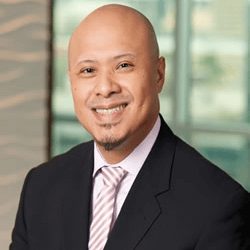Don Purdy helps people’s career dreams come true as the Director of the University at Albany’s executive Weekend MBA Program, a position he has held since 2008.
He oversees all aspects of the AACSB-accredited School of Business program, including recruiting and retaining students, administration, planning the international residency, alumni and community relations, event coordination, catering, and all marketing initiatives.
Don, who has more than 35 years experience, including more than 13 years as a marketing instructor, has a Bachelor of Arts degree in Communication Arts from Marist College and a Master’s degree in Communication from the University at Albany. He is a member of the Executive MBA Council, having recently served on its annual conference planning committee, eight chambers of commerce, the New York Capital Region Chapter of the American Marketing Association, and the Capital Region Human Resources Association.
1. How did you get started in your career as a MBA Program Director?
I used to teach an Integrated Marketing Communications course to senior-level undergraduates in the University at Albany’s School of Business. It was a hands-on course that had students form an in-class marketing communications agency, create departments, and develop a marketing plan for an external client, which included Chevrolet, Nissan, the FBI, CIA, an area law firm, and UAlbany’s Evening and Weekend MBA programs, among others. The classes were conducted as agency meetings and there were no textbooks or tests. We worked with the Weekend program during the Spring 2008 semester. Shortly after the semester concluded, I received a call from the Vice Dean for Administration. She said the Weekend Program Director was leaving for Syracuse University and asked if I’d like to fill in on a part-time, contract basis. I jumped at the opportunity and realized very quickly that it was my dream job. I told her that I would like to be considered for the position and was hired full-time on December 2, 2008. I’ve been here ever since and I still consider it my dream job!
2. What do you think are some of the leadership qualities an effective Business Director should have?
There are many qualities that an effective business director should have. He/she should ensure that staff members are well trained and have the resources to do their job effectively. He/she should empower employees to do what they believe is necessary, within “normal” business practices, to do an outstanding job. Employees should be held to a high standard and the director should encourage them to exceed expectations. A good director should motivate and inspire, make a personal connection with his/her employees, and be empathetic. He/she needs to see the big picture while ensuring that short-terms goals are also reached. He/she should have a good combination of technical and soft skills and be able to communicate the company’s mission and vision in a way in which employees can relate.
Donald Purdy3. Business is constantly changing, what types of things is your school doing to make sure students are learning the most updated business information?
A large part of our instructors’ job is research and, as such, they keep up on the latest trends and developments and frequently present at academic conferences and publish in scholarly journals. They share this cutting edge knowledge over the weekend with our students, who are able to turn around and apply it to their jobs on Monday.
4. Faculty play a critical role in the development of your student’s learning and in helping build their business competencies. What type of things are your faculty involved in and doing that makes their classroom unique to the student’s learning experience?
Many of our faculty have students work on assignments that are directly pertinent to their jobs/companies. Our Entrepreneurship professor has the class’ four groups adopt a local not-for-profit and raise money for it as well as awareness of it. Each group surpassed its goal of $1,000 and one in particular received a substantial amount of publicity in the area media.
5. What type of qualifications and experiences do your faculty bring to the class? How do you make sure they stay updated in their area of expertise and field of study?
Most are full-time tenured faculty members who are subject matter experts and who have accumulated a significant body of research, have presented at academic conferences, held conferences in their area of specialty, and have published books or articles in scholarly journals. Others are adjuncts who are recognized as leaders in their field.
6. Do your students have input on faculty promotion, award and recognition program? If so, can you expand on this and provide examples.
Not really … students complete evaluations after each course and they play a major role in whether faculty continue to teach for us or not.
7. MBA degrees are still in high demand, but the competition is larger than ever. How does your MBA program differ from other schools?
We are the only executive MBA program headquartered in New York’s Capital Region. We also offer concierge-level service to our students as we provide them with their textbooks, course materials, catered Friday dinner and lunch, international business trip, class registration, and parking decals. What’s more, we are the value leader among executive MBA programs in New York State and other program would be hard-pressed to match our responsiveness.
8. Almost every university is going online or trying to offer online degree programs. What is your business school doing in the online space and how do you set yourself apart?
I think we may have been a little slower to adopt online course offerings. We do offer several in our nationally renowned Cyber Security program. The Weekend MBA Program, though, appeals to those who wish to avoid online learning. Instead, we offer a cohort structure, plenty of classroom engagement, life-long friendships, and powerful networking.
9. What do you think are some of the biggest challenges that business schools are facing now and what is your school doing to confront them?
Some of the biggest challenges include increasing enrollment while maintaining a quality educational product in the face of dwindling resources. Our university leadership is working with the community and the State University of New York stakeholders that we continue to succeed during these uncertain times.
10. We learned a great deal about you and your school. If I was a potential student or employer that was stuck between choosing two different MBA programs, what other things would you want me to know about your degree and school to help with my selection?
I believe I’ve mentioned all of the key selling points, i.e., only one headquartered in the Capital Region, the value leader among EMBA programs in New York State, cohort structure, all-inclusive nature, concierge-level service, international trip, responsiveness, dual AACSB accreditation.

Dr. Emad Rahim is an award-winning entrepreneur, educator, author, community leader and TEDx Speaker. He currently serve as the Endowed Entrepreneur-in-Residence at Oklahoma State University and teaches at the Jack Welch Management Institute in the Executive MBA program. He was recognized by the United Nations Foundation as a 2013 Empact100 Honoree for his social entrepreneurship work, received a Congressional Award for his community service and was the recipient of the Forty Under 40 Business Leadership Award sponsored by Syracuse University. His personal story was turned into a short documentary, “Against the Odds,” and featured in the Huffington Post and Forbes. He co-authored “Leading Through Diversity: Transforming Managers Into Effective Leaders” and “The 4-Tions: Your Guide to Developing Successful Job Search Strategies” and is a frequent contributor to the Refractive Thinker book series, CEO Magazine, TweakYourBiz and YFS Entrepreneurship Magazine. Fellow him on Twitter @DrEmadRahim


























